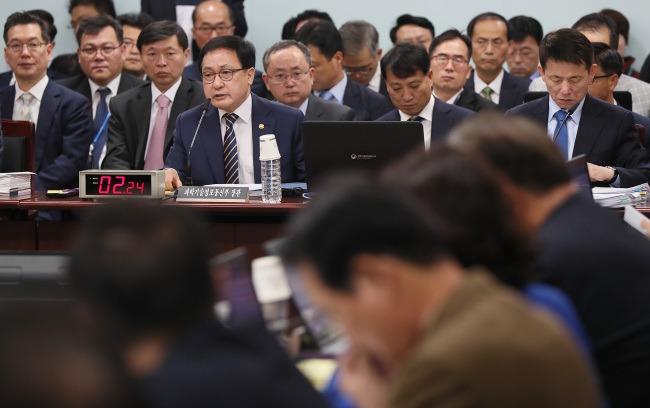Lawmakers urged the Ministry of Science and ICT to fully implement a blacklist system for mobile devices as a measure to further cut mobile bills during a parliamentary audit on the ministry Thursday,
Ruling and opposition lawmakers discussed the reasons behind the heavy burden of mobile costs for households and called for government measures to ease the burden by expanding the blacklist system for mobile devices during the audit at Gwacheon Government Complex in Gyeonggi Province.
 |
(Yonhap) |
Rep. Kim Sung-soo of the ruling Democratic Party said one fundamental solution to fix the high mobile cost problem would be to fully introduce the blacklist system during an afternoon session.
Currently, Korean mobile carriers manage subscriptions of handsets under the international mobile equipment identity system, or widely known as the whitelist system, which the lawmaker argued is a cause of high mobile costs.
Under the system, the prices of mobile devices and calling plans have been inevitably interlocked, concealing from consumers how much they actually pay for their devices and plans.
The blacklist system was partially introduced in 2012, allowing consumers to purchase mobile devices independently and choose a calling plan at one of three mobile carriers.
Science and ICT Minister Yoo Young-min partially agreed with Rep. Kim, but remained cautious on immediate implementation of a mandatory blacklist system.
“Although the system itself makes sense, we need to take a careful approach due to problems with stakeholders in the industry,” Yoo said. “A consultative body will need to be formed to examine possible problems and issues of the system.”
Vice Minister Kim Yong-soo said once the blacklist system is fully introduced, mobile costs for households would rise in the short run, as the system would do away with existing discounts for mobile bills offered by the mobile carriers.
SK Telecom CEO Park Jung-ho attended the audit as a witness to answer questions from the lawmakers on behalf of the telecom industry.
KT Chairman Hwang Chang-gyu and LG Uplus Vice Chairman Kwon Young-soo declined to make an appearance at the audit, citing overseas business trips.
In response to questions that were purported to have the telecom firms to further cut mobile bills, Park acknowledged there is room for further cuts, if stakeholders in the industry can share costs for telecommunications infrastructure.
“With the appearance of smartphones, data traffic spiked and that caused us to spend more on buying frequency spectrums,” Park said. “If stakeholders including manufacturers, content providers and the government, agree to share the costs, there will be more room for fee cuts.”
Regarding the blacklist system, Park said it would help promote competition among market players, leading to new business opportunities.
“The blacklist system is expected to help ease the consumer burdens, so we are considering it positively,” the CEO said.
Choi Sang-kyu, head of domestic sales at LG Electronics, who also attended the audit, said LG will try to provide affordable mobile devices, if the blacklist system is fully adopted.
Meanwhile, Samsung Electronics is said to be negative on the idea to separate the sales of devices and subscription to mobile services. Samsung CEO Koh Dong-in refused to attend the audit.
By Song Su-hyun (
song@heraldcorp.com)








![[Today’s K-pop] Blackpink’s Jennie, Lisa invited to Coachella as solo acts](http://res.heraldm.com/phpwas/restmb_idxmake.php?idx=644&simg=/content/image/2024/11/21/20241121050099_0.jpg)